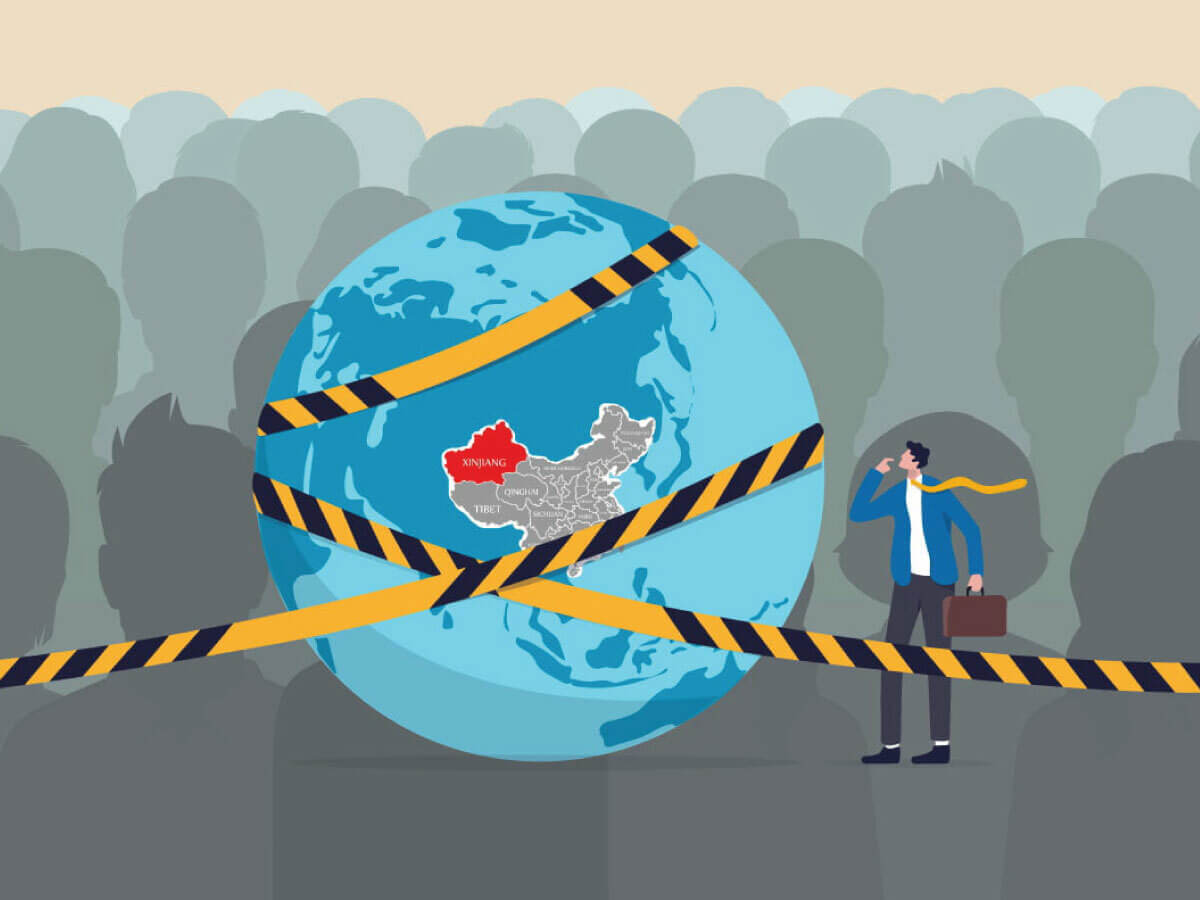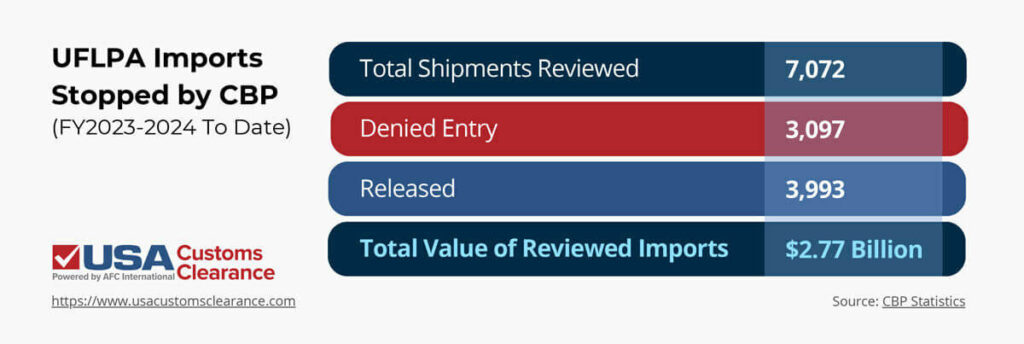
Importers sourcing goods from China need to be aware of the Uyghur Forced Labor Prevention Act (UFLPA). This act essentially bans the import of products originating in China’s Xinjiang Province.
Key Takeaways:
Read on to learn more about the specific products being impacted and how the ban might affect your business.

Don't Let Your Inventory Get Detained
Schedule a Personalized Consultation and Ensure Your Imports are Compliant with CBP.
The ban on products from the People’s Republic of China (PRC) that originate in the Xinjiang Province is enforced as part of the effort to combat human rights abuses against Uyghur Muslims and other ethnic minorities in China.
United Nations (UN) investigators revealed evidence of multiple human rights violations including the detainment of individuals in internment camps, forced labor, and forced sterilization.
This goes against Section 307 of the Tariff Act, which specifically prohibits the importation of goods produced entirely or in part through forced labor.
The Uyghur Forced Labor Prevention Act (UFLPA) was signed in December 2021 to specifically target the commodities of the Xinjiang Uyghur Autonomous Region (XUAR) of China.
It enforces the same law as Section 307 against the import of products made with forced labor, but with provisions geared specifically towards the Xinjiang situation:
In addition to the import ban, the U.S. Departments of Commerce and Treasury has imposed restrictions on more than 30 Chinese research institutes and tech entities.
Any goods that arrive in the U.S. that fall under the Xinjiang import ban will be detained by Customs and Border Protection (CBP). Importers have 30 days to provide clear and convincing evidence that the goods were not made using forced labor. Otherwise, the Xinjiang products must be re-exported out of the U.S.
When the entity list was initially released in 2022, there were only 20 entries. With the support of the current administration, that list was most recently updated July 2024 and now contains 68 specific entities.
These are suppliers, manufacturers, or other sources of goods with known ties to the use of forced labor in the Xinjiang region. There is also a short list provided of commodities that run a higher than usual risk of being associated.
Importers are urged to check this list regularly for changes and new inclusions.
Enforcement of UFLPA policies banning Xinjiang product imports went into effect on June 21, 2022.
The ban will remain in effect until Dec. 23, 2029, or until the U.S. has definitive proof that human rights abuses have ended in the Xinjiang Province and its population is no longer being exploited.
As mentioned, the UFLPA was drafted to be specific to products originating in whole or in part from the Xinjiang Province.
The official language of the act specifically bans any goods “mined, produced or manufactured, wholly, or in part” in the Xinjiang region of China. In other words, any and all products, finished or raw, with ties to the region.
This includes commodities imported from countries that are found to have sourced supplies from the region.
While it may be easy enough to avoid direct imports from Xinjiang, it’s the ‘in part’ section of the act that presents the biggest challenge for importers.
As a major source of several important raw materials exported by the PRC to manufacturing centers around the world, avoiding any and all products that might contain something of Xinjiang origin isn’t easy.
The current high-priority commodities being monitored by the UFLPA enforcement team include:
These can be found across a variety of different products from specialized electronics to mass merchandise.
In the next sections, we’ll focus on two culprits you’ll need to watch out for due to both their volume and origin tracking challenges.
As the region with the second-largest pastureland in China and a vast abundance of arable land, Xinjiang supplies an abundance of agricultural products.
Of top concern to U.S. importers is the cotton grown and processed from the area.
First, consider that even before the UFLPA went into effect, the U.S. had imposed a Withhold Release Order (WRO) on Xinjiang cotton and other agricultural products due to evidence of the use of forced labor.
Second, we need to emphasize that cotton is used in a massive variety of products, ranging from textiles and clothing to paper-based items. Let’s look at one angle of this.
According to the Hong Kong Trade Development Council, the region’s cotton production accounts for nearly 90% of China's total cotton output. In 2022, the PRC exported roughly $12 billion in various cotton materials. That accounts for nearly 20% of the world’s cotton.
Top export destinations that year were:
That same year, the U.S. imported about $632 million worth of garments of cotton knit, just to pick one classification. Who were among the top suppliers? Vietnam, Bangladesh, and Indonesia.
We’re not saying that those products were made with cotton from China, but we are saying that the possibility is higher when importing from that region compared to places like Mexico or Honduras.
If you’re importing a product that contains cotton, especially textile and clothing, do a thorough check of your supplier’s background.
Related: The Complete Guide to Importing Textiles to the US
Electronics manufacturers rely on polysilicon for its efficient use as a conductor. Specifically, it’s one of the raw materials making solar panels more effective and therefore popular.
According to trade data from UN Comtrade and the U.S. International Trade Commission, the Xinjiang region factories produce about 50% of China’s polysilicon. China also happens to be the top global manufacturer and exporter of solar panels, dominating about 80% of the market.
Companies in the U.S. often have little choice in solar panel imports because of this. Since solar panel manufacturing uses so many components, keeping accurate track of the origins of a single raw material used is challenging, especially if it all happens in the same country.
In other words, proving that the polysilicon of a solar panel didn’t come from Xinjiang is a challenge in and off itself.
For more information on this topic, read up on our article: Importing Solar Panels From China, India, and More.
The U.S. Departments of State, Treasury, Commerce, Homeland Security and Labor make up the Xinjiang Supply Chain Business Advisory which provides a full explanation of the import ban and human rights abuses.
The advisory also clarifies what laws such companies would be violating if their products originate from Xinjiang, including:
These are serious crimes, and depending on the nature of the violation, the following consequences are possible:
Simply put, it’s critical that your shipments and imports remain compliant with UFLPA constraints.

Worried about the Strict Regulations? Ask Our Experts.
Our 45 Minute Licensed Expert Consulting Will Personally Guide You.
U.S. CBP enforces the import ban as outlined by the UFLPA and current FLETF strategies. They prohibit the entry of all goods from Xinjiang, unless specifically requested.
To streamline this process, CBP has updated their Automated Commercial Environment (ACE) entry submission system, adding a required postal code field.
If an invalid Chinese postal code is entered, the importer will be given an error message. If a Xinjiang postal code is entered, the user will be given a warning. The intention is to provide an early notification to importers of goods that may have been produced in the Xinjiang region.
According to CBP, $750 million worth of imports has been denied entry to the U.S. since the Xinjiang ban went into full effect.
That doesn’t represent the total value of shipments that have had to be stopped and inspected before release. We have the most recent numbers for those totals in the following graph.

Of note to importers, the origin for the majority of the shipments, based on product value and regardless of whether they were allowed or denied, were the following countries:
Malaysia alone has accounted for $1.55 billion worth of shipments that have needed to be detained for inspection, mostly for electronics.
Import bans are tricky to navigate, even when you have the best intentions. Because of how widespread Xinjiang products can be, you may not even know that your goods are being impacted by the ban.
Working with an import specialist, like the ones at USA Customs Clearance, can give you peace of mind that your imports will be safely brought into the U.S.
Our team can help you review your documents, imports, and suppliers and ensure they are in compliance.
Schedule a 1-on-1 consultation with our licensed professionals, or give us a call at (855) 912-0406 to get the help and answers you need.
 Copy URL to Clipboard
Copy URL to Clipboard
I am concerned about products (clothing) that are being imported with living larva of silk worms. I have identified an infestation within my home and on my body. This problem has been going on for approximate 3 years. I am sure I am not the only USA citizen experiencing this.
Could someone please look into this and contact me.